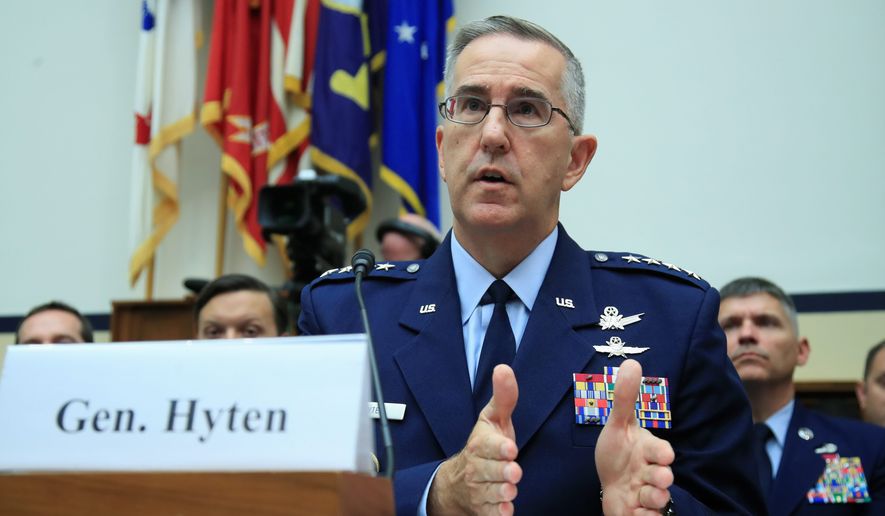President Trump demands quick results, but the Pentagon is about to test his patience as military leaders embark on a daunting mission to assess whether the commander in chief’s call for an American “Space Force” is even practical.
Defense Department leaders over the past several days have huddled with White House National Security Adviser John R. Bolton and other officials to discuss the president’s directive, which would bring about the formation of what Mr. Trump called a “separate but equal” branch of the military solely dedicated to space. While the idea isn’t new — some prominent lawmakers on Capitol Hill have pushed for such a force for years — Mr. Trump clearly expects the Pentagon to act swiftly.
Defense Secretary James N. Mattis, though, said bluntly last week that the “detailed planning” needed to make the president’s policy a reality has “not yet begun,” and other officials suggested that the “deliberative process” will take years.
Inside the Pentagon, there seem to be more questions than answers about exactly what a Space Force would look like, and the notion remains wildly controversial among current and former military leaders, some of whom argue that Mr. Trump is leading the Defense Department down a path that will result in an expensive new bureaucracy that delivers little in the way of tangible results for the American people.
“A Space Force as the sixth branch of the armed forces is a really bad idea, and I hope Congress shuts it down as it considers the legislation it will take to create it. Now is the time to integrate space into all of the armed forces, not to segregate it out into a separate, relatively diminutive entity. We just don’t need more duplication and bureaucracy in the military,” said retired Air Force Maj. Gen. Charles J. Dunlap, who now serves as executive director of the Center on Law, Ethics and National Security at Duke University School of Law.
“Mark my words, the space operators who may think this is a grand idea at the moment will get a rude awakening when the find out all the byzantine administrative baggage that comes with being a separate military service,” he said. “Internationally, I predict this will be interpreted as an overt message that the U.S. is intending to accelerate the militarization of space, something I can’t see how that is in our interests at the moment.”
Indeed, there are already fears that Mr. Trump’s directive, which he says is necessary so the U.S. doesn’t fall behind rival powers such as Russia or China in military preparedness in space, could bring about unintended results and stoke tension with the country’s adversaries.
Russian officials last week, for example, warned of a “tough response” if the U.S. moves to weaponize space. Mr. Mattis has tried to downplay that idea and assure other global powers that a space arms race isn’t on the horizon.
“We are not weaponizing space,” the secretary told reporters late last week. “We are dealing with space as it develops.”
The Pentagon’s policy board is beginning to study the issue, officials said, and the Defense Department is expected to release a report this summer that will thoroughly examine all aspects of a Space Force, including specific responsibilities and the associated costs.
At the heart of the issue is whether a Space Force would provide anything not already offered by existing military sectors, such as Air Force Space Command. Military leaders certainly don’t deny the importance of preparing for confrontations in space — such as the possibility that the nation’s enemies could target crucial U.S. satellites in orbit — and they routinely make clear that it’s only a matter of time before space becomes the next playing field for international conflict.
“Space was once an exclusive frontier accessible to few. Today, the barriers to entry into space are relatively low. Technology advancements and access to, through and from space enable participation by almost any nation with the will,” Gen. John Hyten, commander of U.S. Strategic Command, told a House subcommittee on Friday. “Not all are committed to the responsible and sustainable use of space. We anticipate that Russian and Chinese counterspace systems will be able to hold U.S. satellites in every orbital regime at risk within the foreseeable future.”
Proponents of a Space Force argue that, with those real dangers in mind, it’s time to house all aspects of the frontier — including potential military confrontations and guarding cyber and communication assets — under one roof.
“There is an absolute need for a Space Force as a separate organization in the Department of Defense,” Rep. Mike Rogers, Alabama Republican and chairman of the House Armed Services strategic forces subcommittee, said last week.
Some former military officials argue that it’s likely inevitable that the Pentagon eventually follows through on Mr. Trump’s directive, but that it doesn’t make sense to do so right now for a variety of reasons.
“What is it you’re trying to fix?” said retired Air Force Lt. Gen. David Deptula, now the dean of the Mitchell Institute for Aerospace Studies. “If the issue is one of resources, Congress has it within its authority to fix that with an appropriations bill.
“We have everything in place [militarily] to accomplish the intent of the president’s direction,” he said. “He wants us to be able to dominate the realm of space. Well, we can do that” already.
• Ben Wolfgang can be reached at bwolfgang@washingtontimes.com.




Please read our comment policy before commenting.